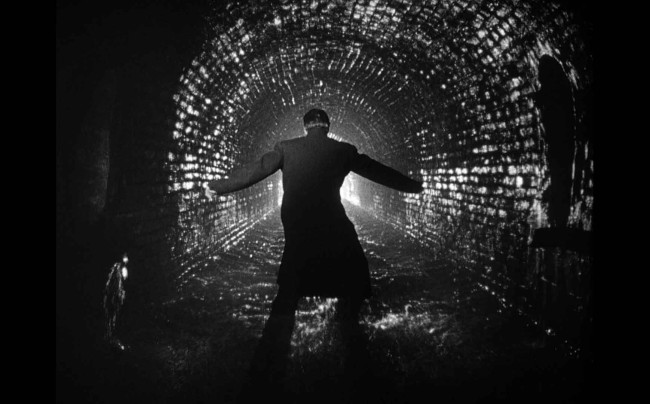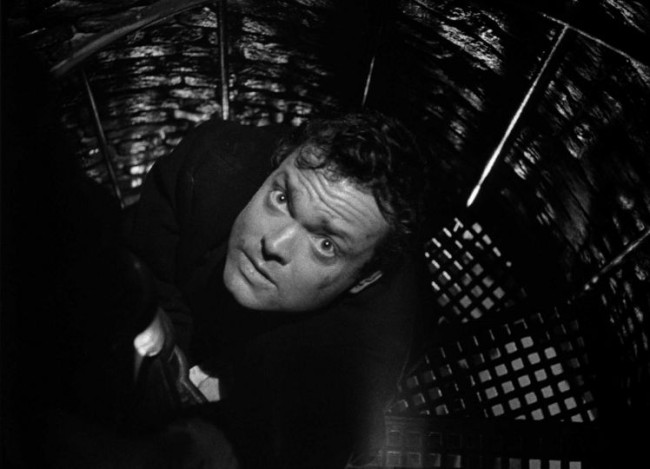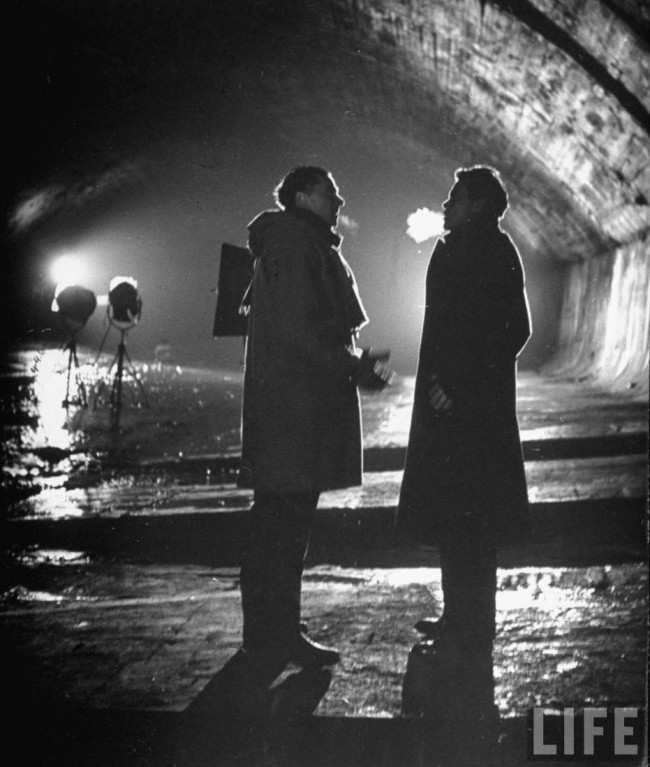By James Hancock June 15th, 2015
I’ve long last track of how many times I’ve seen The Third Man (1949). The Third Man is catnip for film lovers, one of those movies that fills the eyes and ears with ecstasy, becoming more grand and awe-inspiring with each viewing. Film freaks quickly run out of superlatives when describing this movie, but in the very near future they will have a perfect excuse to refresh their vocabulary when discussing the film. Starting June 26th, Rialto Pictures is releasing a pristine 4k restoration of the film which will be playing in select cinemas throughout the US until August (see schedule here). Kenneth Turan has described Rialto Picutres as ‘The gold standard of resissue distributors’ and they solidify this reputation with each and every release. The restoration was carried out by Deluxe Restoration in the UK on behalf of Studiocanal and I was lucky enough to attend a press screening of the restored film at New York’s Film Forum last week. An hour and a half of bliss later I left the theater in a superb mood that has rarely been equaled by any moviegoing experience I’ve had. If you’re new to watching old movies or for some reason have never had the opportunity to see The Third Man, I won’t belabor the obvious by attempting to ‘review’ one of my favorite movies. You’re in a for a special treat and I envy the cinematic discovery Rialto has in store for you. That said, I would like to share some information I learned at the screening which only deepens my appreciation for what I feel is one of the best movies ever made.
Peter Bogdanovich has described The Third Man as ‘the greatest non-auteur film ever made’. He elaborated on this by explaining that the film brought together an incredible array of diverse talents all working at the top of their game each of whom left their distinct fingerprints on the final film. The screenplay is by legendary novelist Graham Greeme who first came up with the concept when he scribbled a simple premise on the back of an envelope. He pitched the idea to producer Alexander Korda who suggested that Greene set the story in Vienna, a battered city that was still recovering from the horrors of WWII and offered the unique setting of a city divided into four quadrants controlled at that time by Russia, France, the United States and Britain. Greene spent weeks in Vienna fleshing out the story living in the same hotel that would become the home of the hero of the story, Holly Martins, played to perfection by Joseph Cotten. Of all the blundering well-meaning Americans ever caught on film, Joseph Cotten’s performance reigns supreme, a performance with a poetic grandeur that I find difficult to put into words. At the heart of this performance is his shared history and chemistry with Orson Welles who was cast as the villain of the film, Harry Lime. Welles is my favorite filmmaker but he was not on his best behavior going into this movie. He essentially forced Alexander Korda to chase him all over Europe to get him to commit to the project all while Korda was fighting with producer David O. Selznick who wished to cast Robert Mitchum in the part. In the end, Mitchum’s arrest for possession of marijuana and Welles’ desperate need for cash to finish his adaptation of Othello resulted in his accepting what is arguably the finest part he ever played.
While Welles may have had many personal flaws, on one front he was especially humble in that he praised director Carol Reed’s work on the film at every opportunity for the rest of his life. Apart from one famous contribution to his dialogue, Welles refused to take any credit for the distinctive look and expressionistic atmosphere of the final film, no matter how much his admirers tried to get him to do so. Carol Reed made many fine films throughout his career such as Odd Man Out (1947) and The Fallen Idol (1948), but with The Third Man he was clearly at the height of his directorial prowess, to such a degree that film historians assumed Welles must have been directing over his shoulder. When discussing the famous closing shot of the film, Welles said, “I was there when they shot it. I wish I could pretend I’d contributed, but I was just standing there, watching them shoot it.” There is one brilliant contribution to the film, however, that is beyond dispute as to who is responsible. In a small café in Sievering just outside of Vienna, Carol Reed heard a musician by the name of Anton Karas playing a zither who was for the most part being completely ignored by the people around him. Karas spoke no English but Reed managed to get him back to his hotel room to record a sample and later invited him to Reed’s home to record what came to be known as ‘The Harry Lime Theme’. It is impossible to think of The Third Man without hearing echoes of this astonishing score in one’s head. From the opening credits to the final shot of the movie, Anton Karas’ music becomes the most important flavor in what is an already rich cocktail. Other than The Godfather, I can’t think of a film where the score and the film are so completely inseparable from one another.
I could easily go on indefinitely singing the praises of The Third Man. I’ve not yet mentioned Trevor Howard who in his own way quietly dominates every scene he appears in nor have I mentioned the astonishing ensemble cast that fleshes out the rest of the story. From the writing to the photography to the invisible editing, The Third Man is a masterpiece from whatever vantage point one chooses to look at the movie. This is one of those rare movies where its admirers have no obligation to concede any points to the movie’s critics nor do they need to make any apologies for their admiration. If there were a Mount Rushmore of great movies, or a Hall of Fame or whatever metaphor one feels like coming up with, The Third Man would always be there. I’ve seen the movie dozens of times and I’ll probably see it dozens more times in the years to come. But more importantly, now we all have the perfect excuse to introduce our uninitiated friends to the movie where it should be seen, in the theater. Thanks to the good people at Deluxe Restoration, Studiocanal and Rialto Pictures, a new generation of film lovers will now have the opportunity to discover this movie for the first time in the best way possible.
The Third Man begins its nationwide run at New York’s Film Forum June 26th-July 9th: Buy Tickets Here.
I am one of the Co-Hosts of Wrong Reel and you can find our content here:








